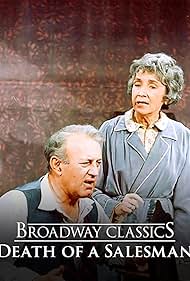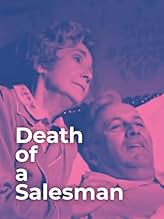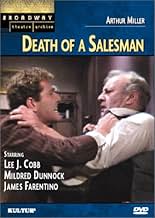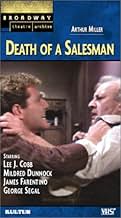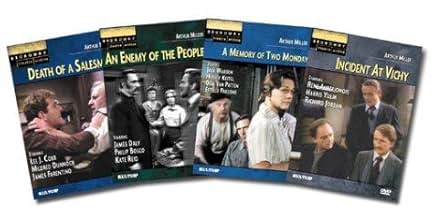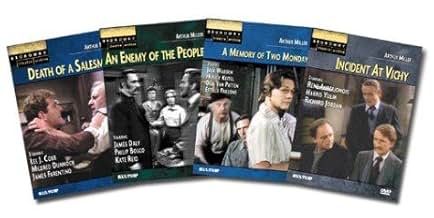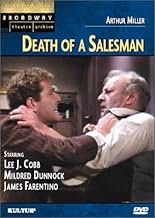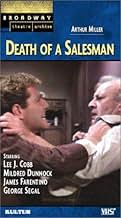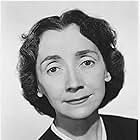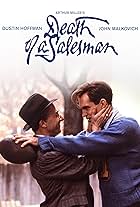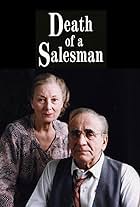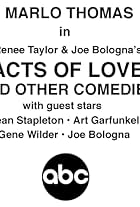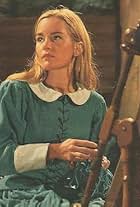An abridged award-winning television adaptation of a famous play about an aging travelling salesman who's on the verge of a nervous breakdown. His job is gone, and his family hates him for n... Read allAn abridged award-winning television adaptation of a famous play about an aging travelling salesman who's on the verge of a nervous breakdown. His job is gone, and his family hates him for never being there. He tries mending things with them.An abridged award-winning television adaptation of a famous play about an aging travelling salesman who's on the verge of a nervous breakdown. His job is gone, and his family hates him for never being there. He tries mending things with them.
- Won 3 Primetime Emmys
- 5 wins & 8 nominations total
Marc Fiorini
- Stanley
- (uncredited)
- Director
- Writer
- All cast & crew
- Production, box office & more at IMDbPro
Featured reviews
Just got this from Broadway Theatre Archive. I would recommend this to anyone remotely interested in this play and the history of American theater. While not the "film" the Dustin Hoffman version is, I found it more moving. It preserves two great performances, the original ones on Broadway. Lee J. Cobb is amazing. More than any other performance of this I've seen, he successfully shows Willy's horrifying diminishment in mental capacity while losing none of his character's or the play's emotional power. Mildred Dunnock is softer toward Willy than her successors but shows the steel within her when she deals with her sons. All in all a heartbreaking performance.
George Segal is good as Biff, but unlike the more evenly balanced Dustin Hoffman-John Malkovich version, is somewhat dwarfed by Lee J. Cobb's Willy. James Farentino, who made a superb Biff on Broadway with George C. Scott, makes a superb Hap.
George Segal is good as Biff, but unlike the more evenly balanced Dustin Hoffman-John Malkovich version, is somewhat dwarfed by Lee J. Cobb's Willy. James Farentino, who made a superb Biff on Broadway with George C. Scott, makes a superb Hap.
When "All My Sons" became too hard to take and critics began to call it a mere timepiece, Arthur Miller wrote another. Instead of life from the well-to-do point of view, he would wander to the other side of the street and look back. "Death of a Salesman" is life from the working man's front porch. And what a telling it is!
Finally, Lee J. Cobb and Mildred Dunnock have one more opportunity together, this time recorded for the ages. And the rest of the cast, superb.
Dear television gods, please bring it back at least one more time. This is a piece that needs to be seen by each generation: a constant reminder of how great the temptation always is to live in greed at the expense of the common man. Thank you again, Mr. Miller, for your wisdom and haunting words.
Finally, Lee J. Cobb and Mildred Dunnock have one more opportunity together, this time recorded for the ages. And the rest of the cast, superb.
Dear television gods, please bring it back at least one more time. This is a piece that needs to be seen by each generation: a constant reminder of how great the temptation always is to live in greed at the expense of the common man. Thank you again, Mr. Miller, for your wisdom and haunting words.
This is my favorite adaption of the play, "Death of a Salesman". The play itself is timeless and could be portrayed in a modern setting (with some updating). Willie Loman and his family will always exist as long as people in all walks or professions are perceived as being past their prime and a liability rather than an asset to society. It is a tragic episode in the life of a family that outgrow dreams and ambitions and must accept reality and human imperfection.
I have had arguments over the fact that I believed Gene Wilder played Bernard in this play before he became prominent in a movie career. This cast is unique with such excellent actors as Mildred Dunnock, Lee J. Cobb, George Segal, James Farrentino, Bernie Koppell and the remaining members of the cast.
I have had arguments over the fact that I believed Gene Wilder played Bernard in this play before he became prominent in a movie career. This cast is unique with such excellent actors as Mildred Dunnock, Lee J. Cobb, George Segal, James Farrentino, Bernie Koppell and the remaining members of the cast.
Clearly, "Death of a Salesman" is the best play that Arthur Miller has written. It is almost as if he wrote it with Lee J. Cobb in mind to play salesman Willy Loman. Lee J. Cobb (then 38 years old) had performed this role on Broadway starring in the original cast. The play ran for 742 performances from February 10, 1949 thru November 18, 1950.
I saw the television movie which ran on CBS television when it was broadcast in 1966. Back then we only had a black and white TV. Thirty-nine years later I purchased the DVD and marveled in seeing "Death of a Salesman" in color.
Sixteen years later a now 55 year old Cobb reprises his Broadway stage role for the television cameras and was emotionally and dramatically perfect. Cobb plays road salesman Willy Loman so well that the viewer can see him having an emotional breakdown as the play progresses to it's conclusion.
Part of the beauty of this television production is how it was video taped on a stage to resemble how an audience would see "Death of a Salesman" if it were being performed on the Broadway stage. The sets resembled those of a stage play. The only major difference is that, unseen by the viewers, the cameras were positioned to afford many dramatic angles and facial shots that could not be realized on a stage with a live audience.
The television movie co-stars Mildren Dunnock as Willy's wife Linda Loman. Ms. Dunnock was also in the original Broadway cast. Her dramatic and long suffering role as Willy's wife is played with emotion and genuine love for her salesman husband. I can never forget when she is scolding her adult sons for their lack of compassion to their father when she says, "....So attention must be paid. He's not to be allowed to fall into his grave like an old dog. Attention, attention must be paid to such a person."
George Segal turns in an excellent performance as Willy's son, Biff Loman, a son whom Willy had such dreams for Biff to be a college football star only to have a riff happen between Biff and his father. When Biff and Willy physically attack each other one can relate to real life when love covered over by hatred exists in real life families.
James Farentino plays the playboy son, Happy Loman who is a disappointment to Willy's dreams and his mother's respect for him. Farentino is well matched as Biff's brother and at times the two brothers reflect upon their youthful years when they were still in high school and the pride of their father's eye.
Gene Wilder (of Willy Wonka and Young Frankenstein fame) turns in a surprise performance at age 33 years old as Bernard the smart son of Willy's neighbor, Charley.
Veteran character actor Edward Andrews gives a fine performance as Charley. Maybe Charley is Willy's only true friend. Throughout the play, Charley tries shows genuine concern for Willy's predicament and tries to help him, to no avail, because Willy will not listen to Charley's wise counsel.
Albert Dekker plays Willy's older brother Ben. Ben is played as an hallucination. Ben's appears in Willy's mind dressed as a successful man who went away to make his fortune. Willy speaks to his brother as Hamlet spoke to his dead father and asks for Ben's advice on whether Willy has done right by his sons. Brother Ben's apparent success torments the mind of Willy.
Bernie Kopell plays Howard Wagner the heir and president of the Wagner Company that Willy has worked at for many years. Bernie Kopell went on to become well known as Dr. Adam Bricker in the TV series "The Love Boat" as well as being cast in many movies and TV series.
Character actor Stanley Adams has a small role as a waiter when Biff, Happy, and Willy meet for dinner. Up until his death in 1977 Stanley Adams appeared in roles in 65 motion pictures. Supporting roles were played by June Foray, Joan Patrick, Marge Redmond, and Karen Steele. At 88 years of age in 2005, June Foray continues to work in films doing cartoon voices. She is the voice of Rocky the Squirrel, Tweety Bird's Granny, and other various voices in 158 movie roles.
The dialogue written by Arthur Miller in Death of a Salesman is quite lengthy and difficult to perform by it's scope. Some passages delivered by Willy Loman comprise a whole page of dialogue. Biff, Happy, and Linda, likewise have dialogue segments of large paragraphs of speech.
I followed the TV play using the play script and did notice that some lines from the play script were omitted during the television production. Some lines were combined and rearranged for the benefit of keeping the camera on the speaker for continuity. Yet, in no way did this detract from the movement of the play.
Everyone who is a lover of good drama should find this DVD and enjoy what used to be the standard fare on television drama during the 1960s when great literary writings were presented to an appreciative audience much different than today's fast paced TV, remote control clicking audiences are now.
Death of a Salesman will keep you glued to your seat and you won't even think of going to the refrigerator for snacks. See this movie. It is a "10."
I saw the television movie which ran on CBS television when it was broadcast in 1966. Back then we only had a black and white TV. Thirty-nine years later I purchased the DVD and marveled in seeing "Death of a Salesman" in color.
Sixteen years later a now 55 year old Cobb reprises his Broadway stage role for the television cameras and was emotionally and dramatically perfect. Cobb plays road salesman Willy Loman so well that the viewer can see him having an emotional breakdown as the play progresses to it's conclusion.
Part of the beauty of this television production is how it was video taped on a stage to resemble how an audience would see "Death of a Salesman" if it were being performed on the Broadway stage. The sets resembled those of a stage play. The only major difference is that, unseen by the viewers, the cameras were positioned to afford many dramatic angles and facial shots that could not be realized on a stage with a live audience.
The television movie co-stars Mildren Dunnock as Willy's wife Linda Loman. Ms. Dunnock was also in the original Broadway cast. Her dramatic and long suffering role as Willy's wife is played with emotion and genuine love for her salesman husband. I can never forget when she is scolding her adult sons for their lack of compassion to their father when she says, "....So attention must be paid. He's not to be allowed to fall into his grave like an old dog. Attention, attention must be paid to such a person."
George Segal turns in an excellent performance as Willy's son, Biff Loman, a son whom Willy had such dreams for Biff to be a college football star only to have a riff happen between Biff and his father. When Biff and Willy physically attack each other one can relate to real life when love covered over by hatred exists in real life families.
James Farentino plays the playboy son, Happy Loman who is a disappointment to Willy's dreams and his mother's respect for him. Farentino is well matched as Biff's brother and at times the two brothers reflect upon their youthful years when they were still in high school and the pride of their father's eye.
Gene Wilder (of Willy Wonka and Young Frankenstein fame) turns in a surprise performance at age 33 years old as Bernard the smart son of Willy's neighbor, Charley.
Veteran character actor Edward Andrews gives a fine performance as Charley. Maybe Charley is Willy's only true friend. Throughout the play, Charley tries shows genuine concern for Willy's predicament and tries to help him, to no avail, because Willy will not listen to Charley's wise counsel.
Albert Dekker plays Willy's older brother Ben. Ben is played as an hallucination. Ben's appears in Willy's mind dressed as a successful man who went away to make his fortune. Willy speaks to his brother as Hamlet spoke to his dead father and asks for Ben's advice on whether Willy has done right by his sons. Brother Ben's apparent success torments the mind of Willy.
Bernie Kopell plays Howard Wagner the heir and president of the Wagner Company that Willy has worked at for many years. Bernie Kopell went on to become well known as Dr. Adam Bricker in the TV series "The Love Boat" as well as being cast in many movies and TV series.
Character actor Stanley Adams has a small role as a waiter when Biff, Happy, and Willy meet for dinner. Up until his death in 1977 Stanley Adams appeared in roles in 65 motion pictures. Supporting roles were played by June Foray, Joan Patrick, Marge Redmond, and Karen Steele. At 88 years of age in 2005, June Foray continues to work in films doing cartoon voices. She is the voice of Rocky the Squirrel, Tweety Bird's Granny, and other various voices in 158 movie roles.
The dialogue written by Arthur Miller in Death of a Salesman is quite lengthy and difficult to perform by it's scope. Some passages delivered by Willy Loman comprise a whole page of dialogue. Biff, Happy, and Linda, likewise have dialogue segments of large paragraphs of speech.
I followed the TV play using the play script and did notice that some lines from the play script were omitted during the television production. Some lines were combined and rearranged for the benefit of keeping the camera on the speaker for continuity. Yet, in no way did this detract from the movement of the play.
Everyone who is a lover of good drama should find this DVD and enjoy what used to be the standard fare on television drama during the 1960s when great literary writings were presented to an appreciative audience much different than today's fast paced TV, remote control clicking audiences are now.
Death of a Salesman will keep you glued to your seat and you won't even think of going to the refrigerator for snacks. See this movie. It is a "10."
This was my first meeting with the play. After finishing it, I felt satisfied, but also far from finished with the play itself. I immediately wanted to see other versions of this, both to compare with this, and to enjoy the great writing. As this is an abridged (by the author himself) version, I'm obviously curious as to what more there is to it. I never felt anything missing.
Lee J. Cobb was made for a role like this. The vulnerable, temperamental and old fashioned man that's grasping for happiness. I can imagine how intimate it must have been to see him act this on stage, and I'm happy that at least we have this TV version of his performance.
The touches done to make this a TV movie instead of a filmed play, did not really add much to the movie. The locations still felt like sets and the performances were good, but theatrical. The transitions, dialogue happening over each other, etc, that is only possible in an edited medium like this, did not add much to the story.
Lee J. Cobb was made for a role like this. The vulnerable, temperamental and old fashioned man that's grasping for happiness. I can imagine how intimate it must have been to see him act this on stage, and I'm happy that at least we have this TV version of his performance.
The touches done to make this a TV movie instead of a filmed play, did not really add much to the movie. The locations still felt like sets and the performances were good, but theatrical. The transitions, dialogue happening over each other, etc, that is only possible in an edited medium like this, did not add much to the story.
Did you know
- TriviaIn his autobiography "Timebends", Arthur Miller said that Lee J. Cobb was his favorite Willy Loman.
- ConnectionsFeatured in Role Model: Gene Wilder (2008)
Details
- Release date
- Country of origin
- Official site
- Language
- Also known as
- La muerte de un viajante
- Filming locations
- Production company
- See more company credits at IMDbPro
Contribute to this page
Suggest an edit or add missing content
